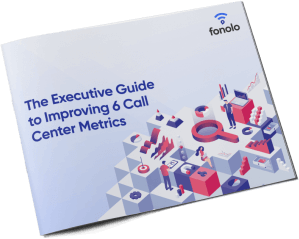Ah, performance reviews. They’re a staple of almost every workplace, and call centers are no exception. In fact, these engagements are an essential part of running a successful customer service operation.
Why? Agent performance directly impacts the caller’s experience. If your agents aren’t satisfied in their daily work, or they’re not doing their job properly, it can spell disaster down the road. Performance reviews are an opportunity for management to evaluate, assess, and lead their team members cohesively in the right direction.
Of course, there are right and wrong ways to conduct a performance review. And agents have a hand in how the interaction goes as well. If one or both sides come to the meeting unprepared, little good will come from the interaction. It’s important for each party to understand the purpose of performance evaluations and how to get the most out of them.
A performance review is the ideal time to:
- Evaluate previously set goals.
- Acknowledge individual successes.
- Identify challenges; create solutions moving forward.
- Update team members on new practices and policies.
Ultimately, well-conducted performance reviews will improve your overall employee engagement, retention, and your team’s overall quality of service. In short, well-supported agents will lead to happier, more satisfied callers.
DID YOU KNOW?
Ideally, performance evaluations should be conducted on a monthly or quarterly basis. The more touchpoints management and agents have with one another, the more opportunities you’ll have to evaluate and achieve your shared goals.
Call Center Managers: How to Conduct a Performance Review
When it comes to performance reviews, preparation is key. The first step is to evaluate the agent’s performance based on observations and activity data in your call center platform. Stats like first call resolution (FCR), average handle time (AHT) and occupancy rate can give you an idea of where your team is excelling and where they’re falling short.
Based on this information, you can plan your areas of focus for each performance review. It may help to split the conversation into categories to ensure all topics are covered in the time you have together. Managers should also have an outline of questions handy to steer the conversation towards important topics. Below, we’ll outline some examples.
Identifying Strengths
Every agent on your team will have strengths and weaknesses pertaining to their job. It’s important that they’re aware of what they excel in, and that management acknowledges their contributions. A performance review is the perfect setting for this.
When asking questions, make them as specific as possible — broad questions invite vague answers; by asking specific questions, you invite the agent to respond with more detail.
Example questions:
- Which of your skills help you excel in your daily work?
- What parts of your job do you find the most fulfilling?
- What is a recent success in your work that you are most proud of?
Areas for Improvement
Of course, performance reviews aren’t just for praising strengths. They’re also opportunities to zero in on challenging areas of the job. Remember that these reviews aren’t for disciplining agents for their shortcomings; rather, it’s all about providing the support they need so they can improve.
Example questions:
- What areas of your work do you feel can be improved?
- What can management do to support you better in your daily work?
- How do you plan to correct these issues in future?
Goals and Outlook
Once you’ve discussed strengths and weaknesses, it’s time to set goals. This helps ensure that there is progress made from review to review and gives both the manager and the agent a sense of progress and hopefully accomplishment.
Example questions:
- What are your priority goals, and how do you plan on achieving them?
- How do you plan to measure your success when working towards your goals?
- How can management support you in achieving your goals?
TIP:
Encourage your agents to use the SMART approach when setting goals. That means their goals should be specific, measurable, attainable, relevant, and time bound.
Career Development
Staying in tune with your agents’ goals and aspirations is worth the effort. Did you know that hiring and training is one of the biggest expenses for any call center. In fact, the average turnover rate for call centers hovers between 30% and 45% — that’s a high figure! Supporting an agent’s career goals will improve employee engagement, minimize turnover, and improve long-term agent retention.
Example questions:
- What types of call center roles do you see yourself progressing towards over the next year?
- Are there any training or professional development opportunities you’d be interested in?
- What aspects of your current role do you hope to carry forward in future positions?
Relationship with Management
You’ve heard the saying: people don’t leave bad jobs, they leave bad managers. Since you’re reading this article, we’ll assume you’re one of the good eggs! If you’re looking for ways to strengthen your professional relationship with your agents, the following questions will help you understand how they perceive you as a call center leader.
Example questions:
- What is your preferred method of receiving feedback?
- Do you have any concerns about management that I can address?
- How can I make myself more available to you?
Call Center Agents: How to Prepare for a Performance Review
Agents are frontline workers, and the main connection between the call center and its callers. But even the most seasoned team members can find performance reviews unnerving.
That’s because call center work can be unpredictable. Between call spikes and frustrated customers, an agent’s individual performance metrics can spike and dip unexpectedly. Because there are so many factors that play into call center performance, it’s important for agents to be able to speak to their successes and challenges, be aware of their strengths and weaknesses, and be able to present a plan for improvement.
While call center managers will be leading the performance review, it’s up to the agent to reflect on their performance and come prepared with information that will help move the conversation forward and prove their commitment to development and growth.
Identifying Strengths
Call center managers want to know that their agents are able to self-evaluate. To demonstrate this, agents should be able to identify their strengths in their role, whether it’s working under the pressure of high call volumes, making genuine connections with callers, or maintaining exceptional KPIs such as FCR and AHT.
Areas for Improvement
Speaking about work challenges can be daunting. To the agent, it may feel like they’re admitting weakness in the moment. But having these discussions is essential to improving the call center operation. A good manager will understand most shortcomings and offer more support. This may involve upgrading call center technology, addressing policies that hinder service, or setting up more training or mentoring sessions.
DID YOU KNOW?
Call-back technology is a simple, but powerful solution to high call volumes, sudden spikes in demand, and customer frustration. Find out how eliminating hold time can improve your call center.
Goals and Outlook
Goal setting is an essential part of the performance review, because it allows managers to track and measure agent success. Using SMART rules is the best approach to setting clear goals. Agents should be ready to discuss progress from earlier reviews and to set new goals as needed.
Career Development
Call center managers invest heavily in their agents, especially during the hiring and training period. The goal is to maintain high agent engagement and encourage internal career progression. Agents should consider their strengths and weaknesses and be prepared to work with their manager to set career goals with the organization.
There you have it! Whether you’re leading as a manager or contributing as a call center agent, everyone has a role to play in performance reviews. We hope your next one produces positive outcomes for your organization.

The Executive Guide to Improving 6 Call Center Metrics
Measuring and improving call center metrics can be a pain point for executives. Download our free guide to help you improve 6 key call center metrics.
